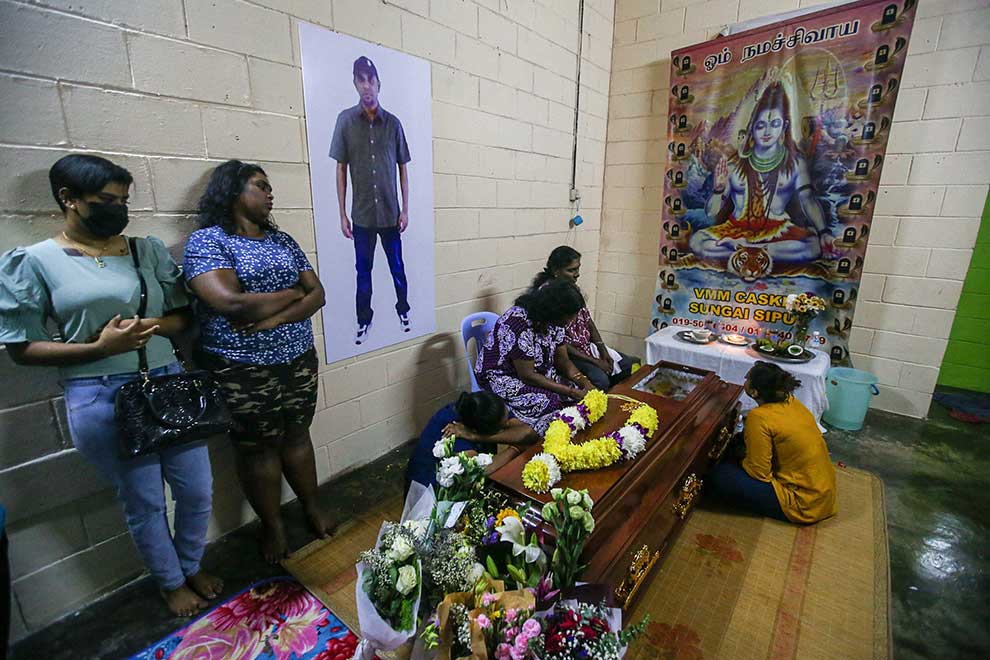
Family members gather by the coffin with the body of Malaysian national Nagaenthran K Dharmalingam, who was executed for trafficking heroin into Singapore, in Tanjung Rambutan in Malaysia’s Perak district, on Thursday. STR/AFP
A mentally disabled Malaysian man was hanged in Singapore on Wednesday, his family said, after losing a long legal battle and despite a storm of international criticism and appeals for clemency.
Nagaenthran K Dharmalingam was arrested in 2009 for trafficking a small amount of heroin into the city-state, which has some of the world’s toughest drugs laws, and handed a death sentence the following year.
The plan to hang him sparked widespread criticism due to concerns about his intellectual disabilities, with the United Nations, European Union and British billionaire Richard Branson among those condemning it.
“It is unbelievable that Singapore proceeded with the execution despite international appeals to spare his life,” his sister Sarmila Dharmalingam told AFP.
The 34-year-old was executed in the early hours, she said from Malaysia, leaving her family “extremely saddened” and “in a state of shock”.
Nagaenthran spent more than a decade mounting legal challenges, but they were dismissed by Singapore’s courts, and the city-state’s president rejected appeals for clemency.
His body will be brought back to the Malaysian city of Ipoh for his funeral, his sister said. Singaporean authorities did not respond to requests for comment.
The European Union (EU) on Wednesday described the death penalty as “cruel and inhumane” and urged Singapore to “adopt a moratorium on all executions” and abolish capital punishment.
The death penalty “fails to act as a deterrent to crime and represents an unacceptable denial of human dignity and integrity,” said Nabila Massrali, a foreign policy spokeswoman for the bloc.
Reprieve, an NGO that campaigns against the death penalty, said Nagaenthran was “the victim of a tragic miscarriage of justice”.
“Hanging an intellectually disabled, mentally unwell man... is unjustifiable and a flagrant violation of international laws that Singapore has chosen to sign up to,” said the group’s director, Maya Foa.
Nagaenthran was originally scheduled to be hanged in November but that was delayed as he sought to appeal on the grounds that executing someone with mental disabilities contravenes international law.
He was arrested aged 21 as he tried to enter Singapore with a bundle of heroin weighing about 43 grams (one and a half ounces) – equivalent to about three tablespoons.
Supporters say he has an IQ of 69, a level recognised as a disability, and was coerced into committing the crime.
But authorities have defended his conviction, saying legal rulings found he knew what he was doing at the time of the offence.
His mother mounted a desperate 11th-hour legal challenge on Tuesday, but it was swiftly rejected by a judge, prompting his relatives to break down in tears in court.
In an interview with AFP on Tuesday, Branson had urged Singaporean President Halimah Yacob to grant Nagaenthran clemency, calling the death penalty “inhumane”.
After exhausting the usual appeals process, presidential clemency was the only avenue remaining to halt the execution.
Nagaenthran’s case has sparked concerns in some quarters in Singapore, and hundreds of demonstrators attended two protests against the hanging in recent weeks.
Protests are rare in tightly controlled Singapore. Without prior police approval, the only place they can be held is in one downtown park.
Vigils and small protests have also been held in Malaysia, and the country’s king and prime minister had both appealed for Nagaenthran’s life to be spared.
A petition calling for Singapore’s president to grant him clemency garnered more than 100,000 signatures.
The city-state resumed executions last month after a hiatus of more than two years, when it executed another drug trafficker.
Activists now fear authorities are set to embark on a wave of hangings as several other death-row convicts have recently had appeals rejected.
Another Malaysian drug trafficker is scheduled to be hanged on Friday.
Despite mounting pressure to abolish the death penalty, Singapore insists capital punishment is an effective deterrent against crime.
The city-state has a low crime rate, and believes the death penalty has helped keep it one of the safest places in Asia.













